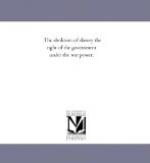Our people also are rapidly finding out that no peaceful termination of this war will be permitted now by the Slave Power, except by its thorough overthrow. The robber has thrown off the mask, and says now to the nation, “Your life or mine!” Even the compromising Everett has boldly told the South, “To be let alone is not all you ask—but you demand a great deal more.” And in his late oration, he has most powerfully portrayed the impossibility of a peaceful disunion. Many men, some anti-slavery, were at first inclined to yield to the idea of a separation. But every day’s experience is scattering that notion to the winds. The ferocious spirit exhibited from the first by the Secessionists towards all dissentients, the invasion of Western Virginia by Eastern, the threats to put down loyal Kentucky, the foray in Missouri, the plan for capturing Washington, which was part of the original scheme, are convincing proofs, that if by any pacification whatever our troops were disbanded to-day, to-morrow a Southern army would be on the march for Washington, Philadelphia, New York, and perhaps Chicago.
The South has sufficiently declared the cause of this trouble to be the irreconcilable conflict between their institutions and the fundamental principles of this government. While the cause remains in full strength, and after it has once burst forth in bloody and final collision, nothing will ever check that strife, whether in or out of the Union. The cause must be eradicated. Meanwhile, our own position, both before the world and in our own struggle at home, is a false one, so long as we blink the real issue.
Many indications are hopeful. Gen. Butler’s letter to the Secretary of War, and the Secretary’s reply, look in the right direction. The Confiscation Act is pregnant with great consequences, and may yet be so used as to become an emancipation act in all the rebel States. It is high time it were so used. We have serious doubts whether the rebellion will ever be suppressed till that trenchant weapon is wielded. We reverently doubt whether the Lord means it shall be. The quiet passage of the Confiscation Act was an immense step of governmental progress. Perhaps it was all that the nation as a whole and the government were ready for. It may answer as a keen wedge. But we trust that, in December, Congress will make clean work by the full emancipation of all slaves in the rebel States, and by provision in some way for the speedy and certain extinction of slavery in the loyal States. To accomplish the latter event, we would ourselves willingly submit to any proper amount of pecuniary burden, provided it could be so arranged as not to recognize a right of property in man.—Chicago Congregational Herald.
PROCLAMATION OF GEN. FREMONT.
Headquarters, Western Division,
St. Louis, Aug. 30, 1861.




